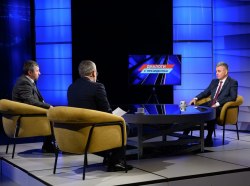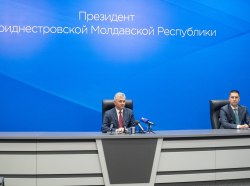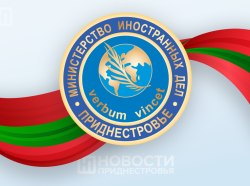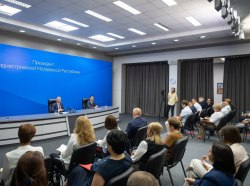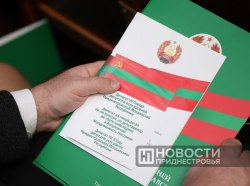THE STATEMENT
On the attempts of the Moldovan side to disrupt the work of the JCC, reformat the activities of the JMC and destabilize the situation in the Security Zone
The experience of the last months of the work of the JCC and the institutes of the peacekeeping operation subordinate to it convincingly shows that the Moldovan side in 2020, taking advantage of the difficulties caused by the widespread of coronavirus infection (COVID-19), demonstratively blocks the leadership of the Commission, tries to question and to some extent reformat its powers established by the 1992 Agreement.
Another attempt to resume the work of the Commission on December 3, 2020, again encountered stiff opposition from the delegation of the Republic of Moldova to the JCC, supported by far-fetched statements and demands that run counter to the Agreement of June 21, 1992, the JCC Regulations.
Today it becomes obvious why the Moldovan delegation is deliberately blocking any compromise decisions of the Commission regarding the approval of the meeting agenda, the leadership of the JCC's control mechanisms to ensure stability and manageability in the Security Zone.
The goal is to force people to change functioning order of the peacekeeping operation structures, to create supposedly visible prerequisites for its restructuring without formal rejection of peacekeeping activities, which have been successfully lasting for more than 28 years.
It is for this reason that, over the past two months, the Senior Military Commander of the MC PF of the RM, Colonel V.V. Staver, categorically refuse, clearly not on his own initiative, to sign a number of JMC reports and even a fully developed JMC weekly report for the period from November 25 to December 1, 2020 on the situation in the Security Zone.
In this regard, the Pridnestrovian delegation during the meeting announced a demand for the immediate signing of the said report by the SMC MC PF of the RM, since it does not contain anything that would not comply with the requirements of the 1992 Agreement and the JCC guidance documents issued in its development.
Thus, the progress that was noted in September-October, which made the work of military observers more transparent, was again reduced to naught.
Not only is the Moldovan delegation deliberately blocking the normal work of the military observers of the four sides in the Security Zone, replacing them with OSCE monitoring activities, this is already successfully confirmed by the numerous information of OSCE representatives in the JCC, which, unfortunately, has a rather one-sided assessment concerning the situation in the Security Zone.
At the same time, the Pridnestrovian delegation states that at the moment refusal of SMC MC PF of the RM to sign reports on the situation in the Security Zone under far-fetched pretexts that have nothing to do with the functions of the peacekeeping institutions established by the 1992 Agreement, in violation of the JCC decisions: paragraphs 2.1,2.2 of the protocol 42614 dated March 6, 20008; paragraph 15.1, 15.2 of the JCC protocol No. 916 of September 24, 2020 means only one thing - there is an obvious attempt to transfer the right to assess events in the Security Zone and make decisions from the JCC to the JMC. And this is an obvious attempt to break down the peacekeeping mechanism that is successfully operating in the interests of maintaining peace.
In this regard, the Pridnestrovian delegation to the JCC appeals to the Moldovan colleagues in the JCC with a demand to immediately stop such dangerous actions. This requirement was voiced on December 3, 2020 during the discussion on approving the agenda for the next meeting of the Commission, which was repeatedly postponed due to the lack of consensus.
Nevertheless, after a lengthy discussion, the Moldovan delegation to the JCC categorically refused to do so. Now there are much more reports on the situation in the Security Zone, unsigned by the Moldovan side – there are already nine of them. There is no doubt that this action was planned in advance and was aimed at another disruption of the JCC work.
Please, note that the work of the peacekeeping operation governing body has been blocked by Moldovan colleagues for more than two months, thereby creating a negative background for the entire peacekeeping operation.
Gathering and analyzing information about the situation in the Security Zone, making appropriate decisions is the main function of the JCC. But now there is no doubt that not everyone needs such a function.
It should be understood that the systemic non-signing of the JMC reports is one of the ways of the Moldovan side to block the normal operation of the peacekeeping mechanisms. This is alarming when the Commission cannot assess the events in the Security Zone, which may well affect the complication of the situation in the Joint Peacekeeping Forces` area of responsibility. This has already been observed during the voting at the elections in RM on November 1 and 15, when the activities of one SMC from Moldova led to a complete blocking of the work of peacekeeping mechanisms, in the context of a rather serious aggravation of the situation in the Security Zone. Apparently, the behavior of the members of the Moldovan delegation to the JCC should be viewed through the lens of statements and appeals that come from the Government Offices of Chisinau.
Let us recall that the recently elected President of the Republic of Moldova, Maya Sandu, announced the need to withdraw Russian peacekeepers from Pridnestrovie and reformat the peacekeeping operation into a civilian mission. This probably served as a guide to action, which could not but affect the work of the JCC. The Pridnestrovian delegation does not hear any proposals or projects, only unfounded and incomprehensible accusations sound from Moldovan opponents. It becomes obvious that in this way a certain background is created and an opinion is formed that the JCC delegations cannot agree.
Meanwhile, we draw the attention of the participants in the JCC work that the 1992 Agreement does not provide for a transition from one form of peacekeeping operation to another. The current format must be unchanged until the conflict is completely resolved. This has been repeatedly confirmed by the leadership of both sides, including documents. A change in the peacekeeping format is fraught with serious consequences.
Under the 1992 Agreement, there are still conflicting parties today. There is a peacekeeping operation contributing to the peaceful settlement of the conflict. But if any of the participants exits this agreement, then there is no reason to doubt that formally there is a return to 1992, that is, to the heated phase of the conflict. This is unacceptable and cannot be done to please one of the parties.
Today it became an accomplished fact that in November 2020, the Moldovan side almost completely abandoned the institution of military observers in the peacekeeping operation. All appeals from the Pridnestrovian side to the United Military Command were refused. The Pridnestrovian delegation to the JCC insisted on including in the agenda the issue of complicating the situation in the Security Zone, blocking the exit of military observers to collect information and monitor the situation in the Security Zone. This is an obvious need. There are already 30 issues in the proposed agenda.
At the same time, it is quite obvious that a number of these issues - which the representatives of Moldova insist on – are clearly political.
Such persistence of the Moldovan delegation is generally well understood, since the JCC is a certain international format.
Therefore, despite the obvious discrepancy between the requirements of the Moldovan delegation and the letter of the 1992 Agreement, the Moldovan colleagues will insist on their politicized issues.
One gets the impression that, in fact, the Moldovan delegation does not care whether this or that issue, which does not coincide with the competence of the JCC, but the issue proposed by it, will be included in the agenda. It is obvious that here it is important to voice it for the international community, to set a precedent.
It is in this that the Pridnestrovian delegation sees primarily the reason for blocking the mechanisms of the peacekeeping operation, which is so actively used by the Moldovan colleagues. Yet this problem is not idle. The Moldovan delegation should really decide what this can lead to. The change in the peacekeeping operation format is clearly at risk of a sharp destabilization of the situation in the Security Zone. Can our colleagues take responsibility for this?
The Pridnestrovian delegation invites all JCC participants to take a closer look at articles 1 and 2 of the 1992 Agreement, the main reference document of the JCC. This Agreement documented the fact of the cessation of hostilities in Pridnestrovie.
The weakening of the JCC leadership in the peacekeeping operation is a serious underestimation of the current situation.
O.L. Belyakov, Co-Chairman of the Joint Control Commission from Pridnestrovie
Members of the delegation of the Joint Control Commission from Pridnestrovie S.G. Kucheryavenko, O.A. Obruchkov, K.M. Kalinenok, R.V. Slobodenyuk, P. V. Mikhailov




